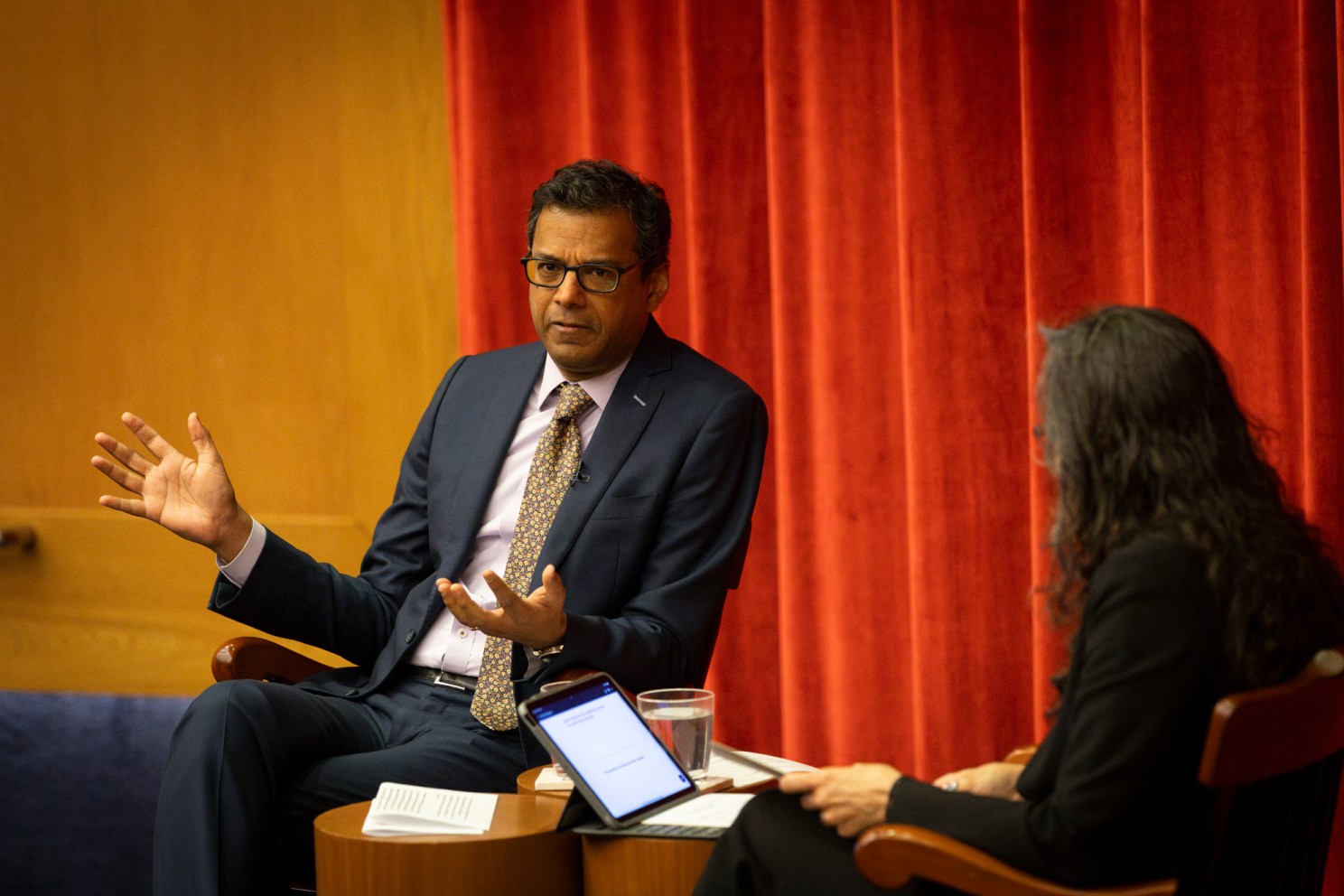‘Devastating’ global health void, Gawande says
Surgeon-author speaks from his experience as a leader at USAID before it was gutted

Atul Gawande with Marcia Castro.
Niles Singer/Harvard Staff Photographer
Surgeon and best-selling author Atul Gawande on Monday provided a close-up account of the damage inflicted by the Trump administration’s dismantling of the U.S. Agency for International Development, but with a note of encouragement to students and faculty to stay committed to science and medicine.
Gawande, a surgeon at Brigham and Women’s Hospital and faculty member at the Harvard T.H. Chan School of Public Health and the Medical School, took leave from the University in 2021 after President Joe Biden nominated him to head USAID’s Bureau for Global Health, a post he called “the best job in medicine that you’ve likely never heard of.” He stepped down at the end of Biden’s term.
“USAID cannot be restored to what it was, but it is not too late to save our health and science infrastructure and our talent.”
Atul Gawande
The firing of nearly all USAID staff and the termination of more than 85 percent of its programs have caused “devastating” damage to millions of people and to the U.S. as a global health leader, he said.
“What I know now, three months from when I departed my role at USAID, is USAID cannot be restored to what it was, but it is not too late to save our health and science infrastructure and our talent,” he said during a conversation with Marcia de Castro, Andelot Professor of Demography at the Chan School. “And it’s not too late to stop the destruction.”
Referencing recent government actions halting Harvard research funding, he added: “I’ve returned to this community as it’s come under attack.”
Under threat, he noted, are federal programs supporting health and science, including at the National Institutes of Health and Centers for Disease Control, and partnerships with universities and medical centers. The funding freeze has hit Ariadne Labs, a Harvard- and Brigham and Women’s-affiliated research center Gawande founded in 2012, endangering research and testing related to surgery, childbirth, and primary care, he said.
Recalling his time with USAID, Gawande said that the agency, working with half the budget of a typical Boston hospital, built a 50-country network to surveil deadly diseases like Ebola and bird flu faster than ever before, cutting emergency response time to global outbreaks from more than two weeks to less than 48 hours. Programs to prevent maternal and childhood deaths, which reached 93 million women and children under 5, added six years to their life spans, he said, while support for programs to prevent and treat HIV, tuberculosis, and malaria dramatically improved outcomes for tens of millions of people. Before he stepped down, USAID was preparing to scale up a novel and inexpensive treatment package to reduce severe hemorrhaging after childbirth, the leading cause of maternal deaths.
Most countries USAID was assisting still have six- to nine-month stocks of medications; it’s the immediate cuts to staffing and services that will now affect health outcomes most acutely, said Gawande, who is this year’s Harvard Alumni Day speaker.
“It’s not just having a solution; it’s the follow-through,” he said. “So much of the power of what USAID does, that I see [the World Health Organization] doing as well, is the technical assistance that gets you from 60 percent vaccination to 80 percent and then to 90 percent vaccination.”
Gawande, who in addition to his work in a medicine is a New Yorker staff writer and the author of several books, maintained that he’s “hopeful” about global health in the long run. Still, he said, “As an American, one of the things I’m quite uncertain about is whether America is going to be part of leading and part of the solution any time soon.”
But if the U.S. is no longer going to take a leading role in global health, he said, other countries and individuals will almost certainly emerge to take the reins — along with leaders in Massachusetts and other states.
Whatever happens in the near term, the work of global health remains vital, he told students.
“You and your expertise will be needed no matter what,” he said.
To view a video of the talk, visit the Harvard Chan School YouTube site.





